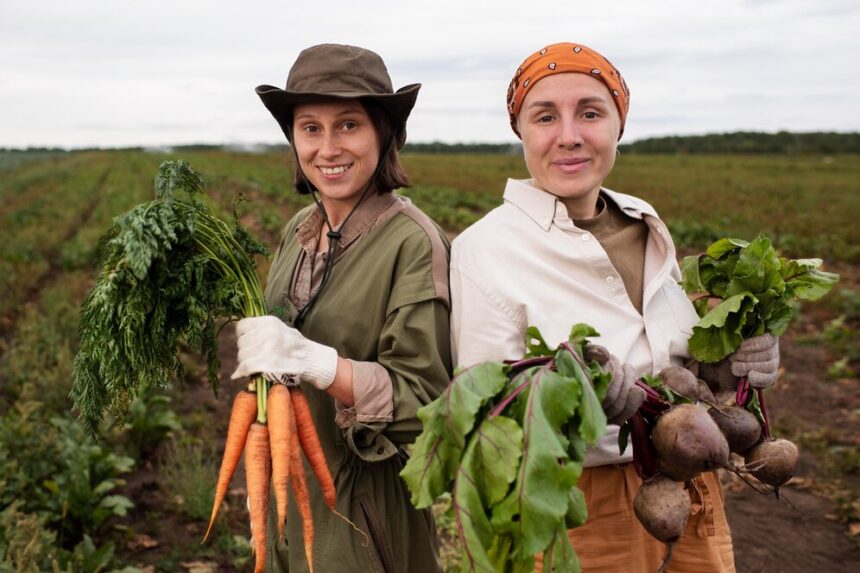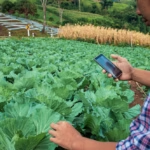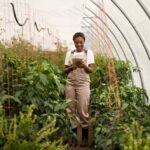Agriculture has long been dominated by men in South Africa, but the tides are changing. Across the country, female farmers are breaking barriers, challenging norms, and transforming the agricultural landscape. These women are not only making their mark in a traditionally male-dominated industry, but they are also becoming powerful advocates for sustainability, innovation, and food security. In this article, we’ll explore the inspiring stories of female farmers who are leading the way and how they are reshaping the future of South African agriculture.
1. The Rise of Women in South African Agriculture
Historically, women in South Africa have faced significant barriers in accessing land, finance, and agricultural training. However, a shift is happening. With the support of various governmental and non-governmental organizations, women are now finding more opportunities to own land, secure funding, and receive the training they need to succeed in agriculture.
In fact, according to recent reports, women now make up an increasing proportion of farmers in South Africa. The South African Agricultural Census shows a steady rise in female farmers, particularly in the areas of crop production, livestock farming, and agro-processing. These women are breaking through traditional gender roles and proving that agriculture is not just for men but a field where women can excel, innovate, and lead.
2. Empowerment Through Land Ownership and Support Programs
One of the most significant hurdles for female farmers in South Africa has been access to land. Historically, land ownership has been skewed in favor of men, particularly in rural areas. However, the government’s Land Reform Program has created opportunities for women to access and own land, empowering them to establish their own farms and businesses.
In addition, organizations like AgriSA and The Women in Agriculture and Rural Development (WARD) have played pivotal roles in helping female farmers secure financial support, land, and market access. These programs provide training, mentorship, and access to financial resources, all of which are crucial for women to succeed in agriculture.
Female farmers are also benefiting from policies aimed at increasing gender equality in the agricultural sector. For instance, various funding schemes are available that prioritize female farmers, offering them grants, loans, and subsidies to help grow their businesses. As a result, women are increasingly gaining the resources they need to break into commercial farming and other areas of agriculture.
3. Innovative and Sustainable Farming Practices
Many female farmers in South Africa are not just focused on production; they are also leading the charge for sustainable farming practices. These women are integrating innovative solutions that balance agricultural productivity with environmental sustainability. From organic farming to water conservation techniques, female farmers are proving that agriculture can be both profitable and eco-friendly.
Agroecology, which combines traditional farming knowledge with modern practices, has gained traction among female farmers in South Africa. This approach focuses on preserving the environment, increasing biodiversity, and promoting soil health. Many women-led farms are now adopting agroecological principles, showcasing how women are leading the way toward a more sustainable agricultural future.
Additionally, technology-driven farming is on the rise among women farmers. Through mobile apps, drones, and GPS technology, women are embracing the digital age to enhance crop yields, improve pest control, and monitor farm conditions in real-time. These innovations are helping women farm more efficiently and effectively, ultimately enhancing food security in South Africa.
4. Breaking Gender Stereotypes and Inspiring Future Generations
Female farmers in South Africa are not just breaking barriers for themselves but are also paving the way for future generations. By challenging long-held stereotypes and demonstrating that women can thrive in agriculture, they are inspiring young girls to pursue careers in farming and agriculture-related fields.
The stories of women like Siphokazi Bopape, a successful poultry farmer from Limpopo, and Nombulelo Magidi, who runs a thriving agro-processing business in the Eastern Cape, are powerful reminders of the potential for women to excel in agriculture. These women are creating role models for young girls, showing them that there are no limits to what they can achieve in agriculture, whether it’s through traditional farming methods or cutting-edge technologies.
5. Overcoming Challenges and Paving the Way for Inclusivity
While female farmers in South Africa are making tremendous strides, they still face unique challenges. Gender inequality, access to finance, and limited market opportunities continue to be barriers that many women must navigate. However, these challenges have not deterred them; instead, they have become rallying points for change.
Female farmers are working together through women’s agricultural cooperatives to increase their bargaining power, share resources, and access new markets. These cooperatives also serve as platforms for sharing knowledge, encouraging collaboration, and building a strong network of women in the sector.
Moreover, government and private-sector initiatives are beginning to address the unique challenges faced by female farmers. Women-focused agricultural conferences, mentorship programs, and funding opportunities are becoming more common, and they provide much-needed support for women to thrive in agriculture.
6. Female-Led Agro-Processing: A Growing Trend
In addition to traditional farming, female farmers in South Africa are increasingly turning to agro-processing—adding value to raw agricultural products by processing them into finished goods. This trend has led to the emergence of small businesses that produce jams, juices, dried fruit, processed meats, and other value-added products.
Agro-processing offers female farmers the chance to diversify their income streams and reduce their reliance on commodity prices, which can fluctuate dramatically. For example, Nomcebo Dlamini, a successful agro-processor from KwaZulu-Natal, has expanded her farm’s operations by creating a brand of locally produced chutneys and sauces. Through agro-processing, she not only increases the value of her products but also contributes to the local economy by creating jobs and promoting food security.
7. The Future of Women in South African Agriculture
The future of women in South African agriculture looks promising. With increasing access to land, financial support, and training, women are poised to take on leadership roles in the sector. By continuing to embrace sustainable practices, technological innovation, and entrepreneurship, female farmers are not only breaking barriers but also building a more inclusive and resilient agricultural industry in South Africa.
As women continue to challenge the status quo and prove their capabilities in agriculture, they are creating a ripple effect that will benefit the entire agricultural community, promote gender equality, and contribute to the country’s economic growth.
Female farmers in South Africa are breaking barriers, defying stereotypes, and reshaping the future of agriculture. Through determination, innovation, and a commitment to sustainability, these women are proving that they have the power to transform the agricultural sector. As more women enter the farming industry and gain the support they need to thrive, South Africa’s agricultural landscape will continue to evolve into a more inclusive, sustainable, and prosperous sector for all.







